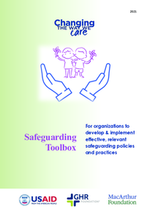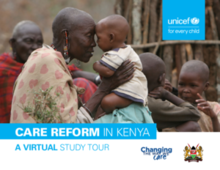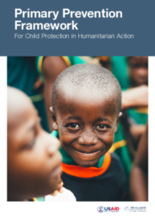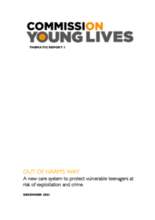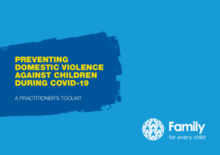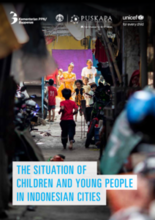Displaying 201 - 210 of 1025
This virtual study tour aims to provide you with an overview of care reform in Uganda from the comfort of your own home. Care reform relates to the care of children.
This toolbox can be used by organizations working with and for vulnerable children and adults, particularly those at risk of separation or living in alternative care. It can support those in the organization who are responsible for:
• Developing and implementing safeguarding policy and procedures
• Assessing safeguarding risk
• Safeguarding in program development and implementation
This Changing the Way We Care virtual study tour aims to provide an overview of care reform in Kenya from the comfort of your own home. Care reform relates to the care of children. It refers to efforts to improve the legal and policy frameworks, structures, services, supports and resources that determine and deliver alternative care, prevent family separation and support families to care for children well.
The purpose of the risk assessment is primarily to enable your organization to gather a snapshot of safeguarding needs and measures related to the activities being or to be undertaken by your organization.
This virtual study tour aims to provide you with an overview of care reform in Zambia from the comfort of your own home. Care reform relates to the care of children.
The article presents the newly collected data on the adoption of childcare deinstitutionalization policy by 15 countries – previously republics of the Soviet Union. Qualitative comparative analysis is employed to explore the role of national-level attributes affecting the timing of policy adoption and the rate of implementation.
The Primary Prevention Framework for Child Protection in Humanitarian Action (the Framework) provides guidance for humanitarian workers on the key actions and considerations to apply when developing or implementing programming to prevent harm to children in humanitarian settings at the population-level. The Framework highlights guiding principles and specific actions to take within each of the five steps of the program management cycle for effective primary prevention efforts. Supporting resources and practical tools are linked within each step.
This report highlights the changing characteristics of children in and on the ‘edge of care’, including unaccompanied minors, increasing numbers of young people with unmet complex needs and BAME young people.
Family for Every Child Alliance members strengthened and adapted their service delivery to provide vital support in the changed circumstances. This Toolkit uses their experiences and lessons learned to guide practitioners to support children and families to prevent domestic violence from affecting children. With specific resources focused on prevention and response, a variety of practices from around the world are given here, to encourage cross-learning and exchange and to generate new learning across the alliance and beyond.
This study combines a quantitative overview of the leading indicators of well-being among children and young people in cities, with a qualitative, in-depth understanding of how daily life is perceived and experienced by the urban young. The quantitative analysis has predominantly employed existing national data sets, such as The National Socioeconomic Survey (SUSENAS) and the Indonesia Demographic and Health Survey (IDHS), to understand the situation of children in urban settings. The secondary analysis assessed approximately 20 indicators that are based on the SDG/Sustainable Development Goal themes, and that align with the Indonesian National Medium Term Development Plan 2020–2024. The combination of secondary analysis, a systematic literature review, and consultations with children and young people generated insights on the constraints and opportunities faced by them and their broader urban communities.


